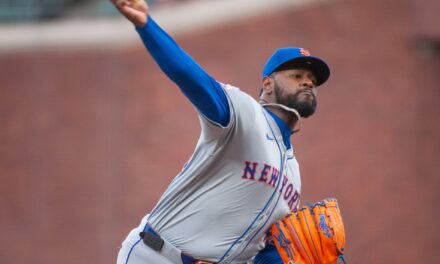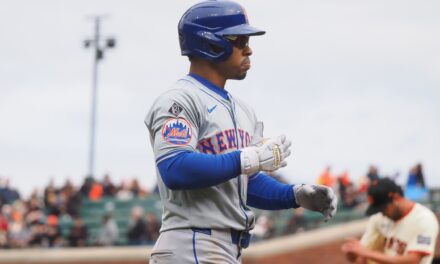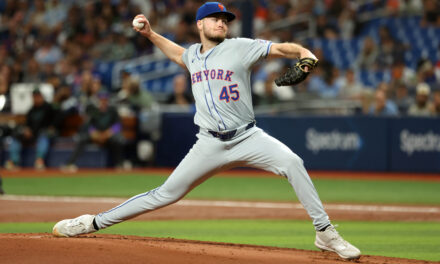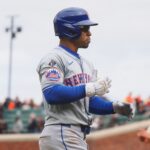
The New York Mets hired Nick Francona, the son of Cleveland Indians manager Terry Francona, last spring to help with the player development in the minor leagues.
Francona, 33, was fired by the Mets in May and says the reasoning goes beyond his work in the front office.
The US Marine Corps veteran that served in Afghanistan, believes that Major League Baseball played a role in his firing from the Mets after just a year with the team. Francona has been vocal about his displeasure with how MLB treats family members of veterans in conjunction with Memorial Day bracelets.
In a recent interview with the New York Post, Francona called the Mets “cowardly” and believed they caved into pressure from MLB in their decision to fire him.
Francona’s beef with MLB goes back to when he was fired by the Los Angeles Dodgers and he accused the team of discrimination. The issue began when Francona went to Home Base – an organization that helps with the invisibly wounds of war in Boston – and his boss at the time, Gabe Kapler, asked if he was doing drugs.
Kapler, now the Philadelphia Phillies manager, allegedly pushed Francona to take a leave of absence and things went downhill from there. Francona declined a reassignment and was ultimately given the choice of resigning or be fired. He chose termination, and asked for an investigation from MLB.
The Dodgers and Kapler were cleared of any wrongdoing in the investigation. Meanwhile, Francona turned down two settlements from the Dodgers, one of $40,000 and another one of $150,000.
Nick was a left-handed pitcher for the University of Pennsylvania and was drafted by the Red Sox in the 40th round of the 2004 draft. He graduated from the Wharton School of Business before joining the Marines in 2009. He also worked for the Los Angeles Angels (2013-2014) as the coordinator of major league player information.
MMO – First off, what was your position with the Mets? What did it entail on a daily basis and who did you work closely with?
Nick – Assistant Director for Player Development. I worked primarily on the minor league side, but was involved in a variety of aspects of the organization, which was nice. In April, Jeff himself spoke to me about my role including creating alignment and quality control across different areas. While that hadn’t been explicitly described to me that way before, it was something I had been doing on my own initiative and was nice to be recognized for it.
I worked closely with Ian Levin, Ronny Reyes, and Kevin Morgan. The four of us were the core group running PD. I also worked closely with the coordinators and minor league coaches.
MMO – At what point did you become aware that you might get fired from that role?
Nick – I sort of felt like it was inevitable once Gabe Kapler got hired in Philadelphia. I got the feeling that keeping me quiet about what happened with him and the subsequent MLB investigation was a priority, and how I did at my job didn’t really seem to matter. That wasn’t too good of a feeling, to go to work each day feeling like you were just a pawn and the efforts for the organization didn’t really matter for whether you had a future there or not. That was tough. At the same time, I enjoyed the work itself, but that was always hanging over my head.
In May, I made comments critical of the Commissioner and MLB’s approach to Memorial Day. This didn’t come out of nowhere. I had tried exhaustively behind the scenes for a very long time to work with them on these issues. It was particularly frustrating because MLB had said time and time again that I would be able to have a huge impact on these issues, and that was sort of their way of keeping me quiet – promising me I could help make them better. And while it felt disingenuous, I did indeed want to help other veterans and military families.
I felt like their approach became more and more cynical, and they ignored me altogether and basically admitted they didn’t want me to have the credibility of being seen to improve these things. I felt like that was pretty dirty and it seemed like they were holding these issues hostage for all the wrong reasons.
I specifically knew things were going downhill shortly before I actually was told. I was leading the Mets Memorial Day program, and we were able to do some really cool and meaningful things with that. I had been asked by the team to film an intro video with Sandy. That part was their idea, and they were the ones that had suggested it. When they posted it online, I noticed I had been cut out. I didn’t really care about being in a video, but it felt fairly petty and confirmed my suspicions.
MMO – Basically, you feel the Mets decided to move on from you because of the comments you made critical of the league and not the actual job you performed for the team? Do you feel that the league pressured the Mets into your dismissal?
Nick – Yes, the Mets said that themselves. They were very honest about it. What I posted online was the verbatim recollection. They didn’t even pretend it was for other reasons, and in fact, praised me profusely for the work I had done. What was really hard to swallow was that I was also praised for the impact I had on MLB’s veterans and military programs. That was frustrating because they basically admitted that it required me taking a stand and speaking out, but then punished me for doing so. To be clear, I very much resent that it required speaking out about these things. I think it is beyond silly that it got to that point, but I felt like I had no other choice.

MMO – When and how did you find out the Mets were firing you?
Nick – I was in Atlanta for Memorial Day, as the Major League team was playing there. I was there to coordinate some of the things we were doing with a few Gold Star families. Sandy asked to meet with me when I got back the next day. The day after Memorial Day, we met. It wasn’t really a conversation or a discussion and it was just delivering the decision. He encouraged me to resign rather than have them terminate me, and they even called my dad afterward to try to get him to encourage me to resign as well. I felt like this was silly, as I was proud of my actions and felt like it spoke more about the Mets bending to the will of MLB.
I am certainly embarrassed about being fired (twice now). It is frustrating as it feels incredibly unfair and it’s humiliating to go through. But I also feel strongly about these issues and have been put through a lot already, and at least want to see them improve.
As far as your earlier question about MLB pressure, yes, I am certain that happened. I saw MLB vehemently denied that, which is laughable. I heard from multiple people on multiple occasions, dating back months, that MLB was pressuring the Mets. Even worse, I heard that the Phillies were pressuring the Mets and MLB. That part is really distasteful, and is sort of the dynamic that I was getting at earlier, where it feels like your own employer is more concerned with the reputation of a division rival’s manager than they are about their own employees.
One of the most senior people at MLB even told my dad that the Phillies’ owner was making calls to Jeff Wilpon. He said that in an effort to deflect responsibility away from MLB, but it goes to show the absurdity of the entire situation.
MMO – Do you feel like the Wilpons’ close relationship with MLB (basically spoon fed them Sandy Alderson) played a large role in your dismissal? Like they owed it to the league to do what MLB wanted in the situation?
Nick – I don’t want to speculate on their motivations for acting the way they did or why they were so malleable with MLB. Whatever the reason, they were easily pressured by MLB. That wasn’t just on my issue, but a common theme. As it pertained to my issue specifically, it was particularly disappointing because I felt like it could’ve been easily resolved and everyone could’ve moved on productively had the Mets stood up for me earlier on, but it was clear that wasn’t going to happen.
For example, when I was first working for the Mets, that was while MLB was doing its investigation. There were some things that happened that were shocking. Like way out of bounds. I was stunned that the Mets didn’t stand up for me at all on those issues and say, “this isn’t ok.”
The Dodgers were making accusations that everyone knew to be false, and were just belligerent in their approach. They were so confident in the Mets complicity, that they even came out and told them, “What is Nick going to do? He can’t do anything to us.” What they meant was they knew that if I wanted to work in baseball I had to be quiet and they could just lean on the Mets, which is precisely what happened. And then when Gabe Kapler was hired by the Phillies, you add another team to that mix, and it wasn’t a whole lot of fun for me.
MMO – You said the Wilpons/Mets were easily pressured by MLB and not just on your situation, what other situations did you see this behavior applied to?
Nick – DL decisions, stuff like that. Teams take different approaches to how much they will bend the rules, and that is sort of expected even by MLB. There are obviously teams that take things to the extreme in pushing boundaries. The Mets were on the other side of it where they would almost put themselves at a disadvantage by being so afraid of the Commissioner’s office that it was almost like playing under a different set of guidelines than everyone else.

MMO – As an outsider, I sense a lot of breakdowns in communication between the team and the front office which was so apparent when Terry Collins was the manager. There was even a communication gap at the minor league levels. First of all, would you agree their was a counterproductive ack of communication, and secondly, what was the root of this issue?
Nick – I think it is certainly fair to say that there were communications issues. I am hesitant to pin those on any one person, because I don’t think that is accurate of the root cause. I think it was more of an issue of organizational culture and setting expectations, and then holding people accountable for their actions. And that goes straight to the top.
Back when Terry Collins was the manager, there was a very clear divide between the major league team and the front office, which was evident right away from my first days there. That happens from time to time in different places. What was more troubling was the culture of leaking, where you have an organization where people so consistently talk shit about each other to the media. It’s really bizarre.
As I said to a colleague early on, people there complain about the media and are very fearful of them there, but to me that is like throwing chum in the water and wondering why the sharks show up. There is almost an institutional instinct with the Mets to avoid the truth and speak in these Orwellian terms.
At a certain point, you see enough statements where everyone watching them knows they are bullshit, including the fans, other employees, heck, even the person saying them – you see enough of those and it distorts reality and makes it seem like the truth doesn’t matter. And in my opinion, that’s really unhealthy.
There are certainly good reasons to hold certain information closely and you don’t always have divulge every last detail, but you also don’t need to outright fabricate every mundane thing. So much of the lack of trust with the fan base is just an external manifestation of the actual culture there, and it is entirely self-inflicted.
MMO – There have been so many reports describing the chaos and dysfunction in the Mets hierarchy and front office. What was it like to be a part of that environment?
Nick – I had heard things before I started so I expected some of that going in. It’s one thing to hear it, but another to see it up close. No organization is going to be perfect and they all have their own warts and intricacies. I knew there were going to be some limitations on what was possible to accomplish, so that actually made it pretty easy to handle in some ways, because there is no sense in fighting it. I tried to recognize the areas that I was able to impact and change and try to focus on those and not spend too much time getting upset over stuff that I had no control over.
There were plenty of times where you sort of know what’s going on i silly, discuss it with others, and once share your opinion, but once you get to the point where it’s happening for a reason and it’s clear that’s not going to change, you just have to move on.
In my opinion, where it becomes even more detrimental is when an attitude of defeatism and complacency starts to creep in, and people are either afraid to push back when they disagree on something or have a different opinion, or they just become apathetic, and their goal is just to remain employed. I don’t think those types of approaches are conducive to sustainable winning, or sustained success in any endeavor or that matter.
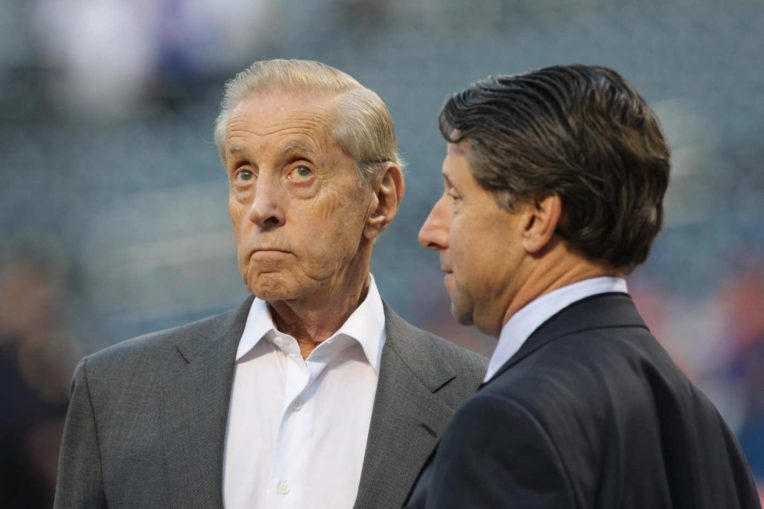
MMO – All owners are different and most meddle at varying degrees. But with the Wilpons it seems to go beyond that. It seems like they have to have their finger in every pie. Is that fair to say?
Nick – Yes
MMO – In what ways did they have a finger in things that you thought was unusual for an owner?
Nick – There are many different manifestations of it. Even mundane things like certain press releases or public statements. I don’t want to get anyone in trouble that is still there, so I want to be cognizant of that. I will say I was very surprised by the level of involvement in seemingly ordinary minor league decisions even.
At the end of the day, the owners can run a team however they see fit. That is certainly their right. And I don’t have to agree with it and the fans don’t have to agree with it. That being said, if someone is going to be employ me to act in the best interests of the organization, I’m sure as hell going to do that, and that includes faithfully giving your best effort and honest opinion.
I think it is important to distinguish between viewing loyalty as this concept of blind personal fealty towards an individual, vs. putting the interests of the organization ahead of your personal interests and accomplishing the mission. I think when people start to fear for their jobs if they don’t kiss someone’s ass or if they rock the boat too much (even in a good way), they become more focused on self-preservation and less focused on winning, and that’s a really unhealthy place to be for any organization.
MMO – Do you think that the Wilpons scared some people into toeing the company line unnecessary so, and that it played a role in the failure of communication and honesty as a whole?
Nick – I don’t know if it would be fair for me to say it as that black and white based off the time I was there. But I do think that the people at the top of the organization are responsible for everything an organization does or fails to do, and both directly and indirectly, the leadership, or lack thereof, contributes to a suboptimal culture.
MMO – How would you say the role of ownership in New York differed from the Dodgers organization?
Nick – In New York, it was more present in decision-making processes, both big and small. Again, sometimes that doesn’t even mean directly involved, but once that culture and norm is established, people begin to act with that in mind on their own.

MMO – As a person who served in our military, I’m sure you’re well aware of the importance of having a chain of command and having everyone adhering to it with no breaches. And while it may go by a different name in the public sector, it’s still essential to a well functioning corporation or sports team. Do the Mets have a chain of command and stick to it or is everything run as haphazardly as it appears?
Nick – I wouldn’t necessarily accept that framework of a chain of command as gospel for all organizations, and I think a lot of people are usually surprised by the concept of it in the military. People often view it as very rigid and inflexible, and the reality is that the chain of command and detailed planning is often done to enable flexibility.
On that topic, I would recommend checking out Gen. Stanley McChrystal’s book, Team of Teams. It’s a great read on organizational dynamics and communication, and how he adapted a lot of the things that were traditionally done in the military because they were no longer as effective as they needed to be as the world changed.
So all of that being said, I think the important part is less a strict chain of command and more being on the same page and having common expectations and understanding. To use another military term – having a Common Operating Picture (COP).
As that pertains to the Mets, I think it is more of a cultural issue than a chain of command issue per se.
I think you want to encourage dynamic organizations and interactions with people across departments. Some of the most junior people often have really good ideas, and I would never want to suppress someone who could make the organization better because I was too rigid in my management style. There are obviously ways to empower people without it becoming chaotic. I think the Mets issue was more about so many different agendas and internal politics than specific structures.
MMO – Let’s slide more into your actual role with the Mets. Sandy Alderson spoke about minor leaguers not being prepared when they came to the big leagues last year, is that something you were tasked with helping with and how did you go about doing so?
Nick – I viewed it as we were all tasked with improving that, not just any person individually. Even TC had a role in that as well, as he was in a good position to evaluate that having been at the ML level so recently. Some of it was establishing what the expectations are at the ML level, and ensuring those don’t come as a surprise to players when they get up there for the first time.
There are other things that are much more of a long term orientation, like how to teach certain facets of the game and what is emphasized. Those types of things aren’t quick fixes and aren’t quite as visible for many years. That’s both the beauty and frustration of player development – there is often a very long lag time between the work and the results paying off. But if you do it the right way it can actually make a huge difference.
In recent years, I have actually become increasingly convinced that there is probably an inefficiency to be exploited by simply being ruthless at the execution of fundamentals. While it sounds boring to try to be outstanding at things like holding runners and other concepts like that, it is actually pretty exciting from a player development perspective, because those are the types of things that are more “trainable” and you can have more of an impact on.
In general terms, I thought a good way to prioritize was evaluating priorities on two dimensions: How trainable they were; and how much they mattered. Things that were high on both dimensions are a great thing to prioritize.
Sometimes things that are independently less important, but that you can change a lot, those might be those under the radar inefficiencies. The opposite of that, things that are highly impactful but harder to change, things like running speed – where it shows up in many different facets of the game – that might be harder to improve, but even small improvements can really matter in aggregate. I think using that framework can be helpful in determining the areas to focus on.
MMO – What do you feel like you were able to improve in the Mets player development during your short stint with the team?
Nick – I feel like we were able to get a good foundation for putting player plans in place. That is still a work in progress to get it fully integrated, but there was substantial improvement. I felt like we were also able to make steps forward in the professional development of some of the coaches and coordinators, and exposing them to new ideas and encouraging them to find ways to make the organization better on their own as well.
With all of the stuff, none of it is an individual effort and I think the level of collaboration in player development was very good and something I enjoyed about the organization. I had some really outstanding colleagues in that department.
MMO – What are still a few areas that you would’ve tried to focus on in 2019 and beyond in the Mets system?
Nick – Physical development and skill development were two areas we were digging into a lot. Those are a natural follow on to the player plan process and the concept of identifying areas that are trainable and impactful, and prioritizing accordingly.
The organization overhauled a lot of the medical and S&C side at the Major League level this past offseason. We hired someone who recently started to be the performance director at the minor league level, basically a counterpart to Jim Cavallini. I think that will be really helpful in integrating a lot of the physical performance components and will also open new doors for actually developing players in new ways.
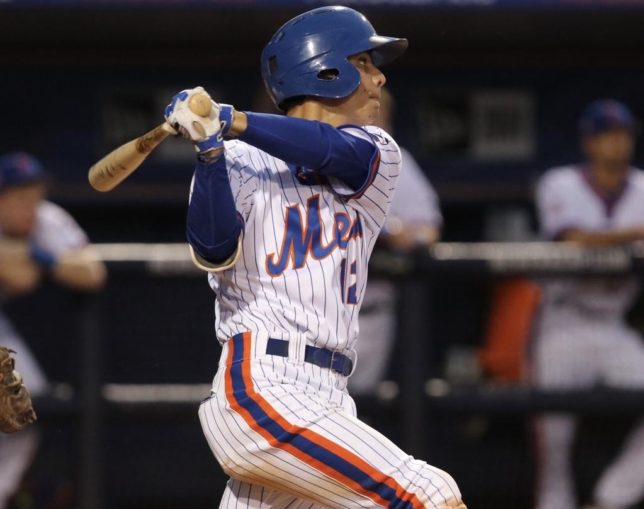
Andres Gimenez/Photo by Ed Delany, MMO
MMO – Name five Mets prospects that impressed you during your time with the Mets and why?
Nick – Tim Peterson: This is a guy who gets the most out of his talent and does all the little things well that allowed him to get to the big leagues. His stuff is a little short, but he worked hard on using it as effectively as possible and making small improvements and it has really paid off for him. I was thrilled to see him get to the big leagues.
Jeff McNeil: He would get lost in the shuffle and had a tough time with injuries in the past. He has always shown some ability in the box, and has really put it together this year. He can’t do much more than what he’s shown. Really controls and AB well.
Andres Gimenez: Very talented, but he’s not in the same class as some of the other guys on top prospect lists in terms of raw physical talented, but he will get the most out of his ability. I think he is underrated athletically and will show more pop as he matures and learns to zone in on pitches he can really drive. Andres is highly intelligent and a great teammate, basically exactly the type of guy you want your top players to be.
Luis Santana: Absolutely love watching this guy play. He’s electric and hyper aggressive, isn’t afraid of anything. He has a lot going on with his swing at times, but is able to get to a really athletic hitting position and he doesn’t get cheated.
Shervyen Newton: Might be one of the more underrated players in the Mets’ system. He does a lot of things really well already, and is still very projectable. He is definitely someone to keep an eye on.
MMO – One final thought on the Mets organization as a whole, do you think they can compete again in the short or long-term? Do meddling owners make that a tougher possible outcome to imagine?
Nick – I think the biggest challenge right now for the Mets from a broader organizational perspective is finding a way to restock the talent base. They are short on impact talent both at the ML level and at the upper minor league levels. When you are in that situation, it doesn’t make it impossible to win, but it makes it very challenging. You have very little margin for error and need everyone to stay healthy and also have all the free agent signings go right. When you hear teams talk about injuries often, that is usually a sign that they are short on talent and depth. Teams have injuries every year. Some teams have it worse than others. But when it’s the same conversation year after year, it’s time to look in the mirror.
At the lower levels, there are some really exciting young players that have a chance to be impact ML players. Obviously they will not all pan out and it takes time for the picture to develop, but I think there is cause for optimism at the lower minor league levels with some really exciting players.
As far as owners or any other factors like that, it’s really not something you can worry about on a daily basis when you’re in the middle of it working there, because you still want to win, and there aren’t asterisks for second place trophies saying “You did a good job in spite of whatever factors made it harder.” Nobody cares. And they shouldn’t care. Results are what matters and at the end of the day you need to win. No other teams are going to feel bad for you because of any factors like that.
I think the organization has a bit of a “woe is us” type of mentality, especially when comparing themselves to other organizations, particularly in this city. I think they need to assess what they want to be, and how they are going to achieve that.
One of the last things I was working on (and ironically happened the week I left) was I brought in James Kerr, who is the author of a book called Legacy. The book is about the New Zealand All Blacks, and covers the things they did to build and maintain an elite organizational culture that is conducive to sustained winning. James spends a lot of team looking at different organizations, like the British SAS, and identifying the elements that make groups elite performers. My hope was that some of the concepts he discussed would hit home and lead to some positive change.
MMO – Thanks for your time, we really appreciate it.
Nick – You’re welcome, thanks for having me.


